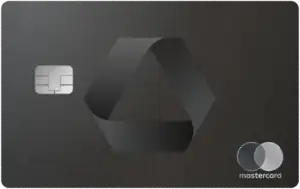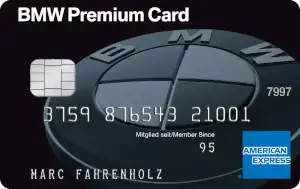How we earn our money
We finance our services on how-to-germany.com through affiliate programs.
When a user orders a financial product through our site and their application is approved, we may receive a commission from some providers. It’s important to note that this does not in any way influence our independent ratings and recommendations.
All the products we present on how-to-germany.com are selected for their quality, range of services, and excellent value for money.
Charge Credit Cards in Germany
- Charge credit cards offer temporary credit with no interest if the full amount is repaid on time.
- A monthly repayment is required; no installment payments are permitted.
- Commonly, a German bank account and a positive Schufa credit score are required.
- Many cards include valuable extras, such as travel insurance, cash back, and purchase protection.
- Ideal for expats with stable income who want convenience, flexibility, and bonus features.
- Real charge cards are, for example, offered by DKB, Commerzbank, Deutsche Bank, American Express, and various saving banks. Additionally, many revolving credit cards can be configured to behave like charge cards by enabling full monthly repayment without interest.
Best Charge Credit Cards in 2025
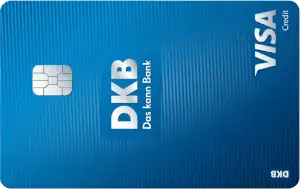
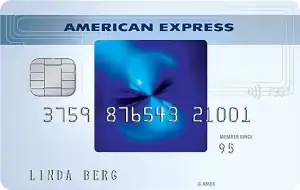
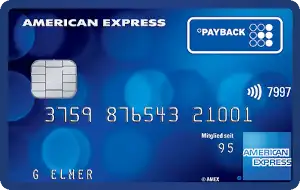
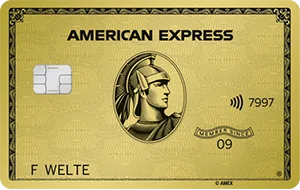
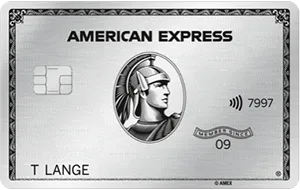
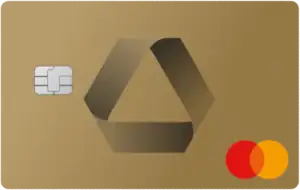
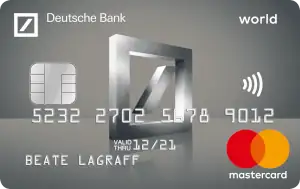
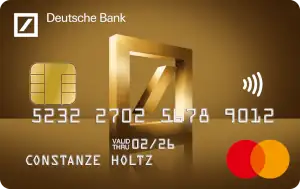
What Is a Charge Credit Card?
Charge cards are real credit cards with an overdraft facility.
A charge credit card allows you to make purchases throughout the month and settle the entire balance in one payment at the end of the billing cycle. Unlike revolving credit cards, charge cards do not permit partial payments or carry interest on outstanding balances, provided the bill is paid on time.
In Germany, this card type functions like a short-term, interest-free loan. The total amount spent is billed monthly (credit card bill), and repayment is typically withdrawn automatically from your linked bank account. If you miss a payment, the provider may charge late fees or restrict the use of your card.
Charge cards are ideal for expats who want the flexibility of delayed payments without the risks of accumulating debt. They are also a popular option among those who value financial discipline, predictable billing, and premium features like travel insurance or reward programs.
While you won’t be able to spread out payments over time, the clarity of monthly settlement and often generous credit card limits can make them an excellent fit for stable earners.
Most modern charge cards support contactless payments via NFC, as well as smartphone wallets like Apple Pay and Google Pay.
Charge Cards versus Other Credit Card Types
Charge credit cards offer a unique payment structure that sits between debit cards and revolving credit cards. They are best suited for users who want a short-term credit line but prefer to avoid interest charges. Expats with regular income and a German bank account can benefit from the convenience and stability of monthly billing, without falling into long-term debt.
Credit Card Types in Germany — Quick Comparison Table
| Card Type | Credit Function | Interest Charged | Payment Structure |
|---|---|---|---|
| Prepaid Card | ❌ No | ❌ No | Pay in advance |
| Debit Card | ❌ No | ❌ No | Immediate deduction from the checking account |
| Charge Card | ✅ Yes (short-term) | ❌ No, if paid in full on time | Full monthly payment |
| Revolving Card | ✅ Yes (long-term) | ✅ Yes, on the unpaid balance | Installments or full payment |
| This table offers a general overview. Terms can vary between banks and card providers. | |||
When to Choose a Charge Card Over Other Types?
Choose a charge credit card if you:
- Have a regular income and a stable residence status in Germany.
- Prefer to avoid paying interest or late fees by settling your credit card bill in full each month.
- Want access to premium features (e.g., travel insurance, rewards programs).
- Need a reliable card for international travel or major purchases.
- Don’t need the flexibility of long-term installment payments.
Charge cards offer structure and stability — ideal for financially disciplined users who want to transfer money later without paying interest. However, always read the fine print regarding late payment fees and repayment methods.
How Charge Cards Work in Germany
Charge credit cards function as short-term credit instruments. Instead of drawing money directly from your account for each purchase (like debit cards) or allowing you to repay over time with interest (like revolving credit cards), a charge card collects all your transactions during the billing cycle. You settle your credit card bill in full once a month.
Monthly Billing Cycle
Every transaction made with a charge card is recorded during a set billing period — typically 30 days. At the end of this cycle, you receive a credit card statement summarizing all your purchases, transaction fees (if any), and the total amount due. This amount is then automatically debited from your designated current account.
Linked Bank Account and Automatic Repayment
To use a charge card in Germany, you need a linked bank account, usually a German checking account (Girokonto). The total balance due is automatically withdrawn from this account on the due date — no manual action is required. This makes charge cards reliable and low-maintenance, especially for expats who want predictable payments without the risk of missing a deadline.
No Interest If Paid On Time
As long as the total amount is paid in full and on time, you pay no interest. In essence, the credit card company often grants you an extended interest-free credit period, which can extend up to 60 days depending on the issuer. This makes charge cards especially attractive for expats who want to spread the cost of purchases without falling into debt.
High Security of Charge Credit Cards
Charge credit cards offer a high level of security for both everyday use and online transactions. Compared to debit cards, they offer users more effective protection against fraud and misuse.
General security features
- Payments are not deducted immediately, giving users time to detect and report suspicious activity before repayment.
- No direct access to your bank account – unlike debit cards, the charge card acts as a buffer.
- Ideal for online shopping, subscriptions, travel bookings, and rental services (depending on the card, frequently with a discount).
Limited liability in case of misuse
- In the event of card loss or fraud, user liability is limited by law to €50 — provided the cardholder acted with reasonable care and reported the incident promptly.
- Most providers, including American Express, waive this liability entirely if no gross negligence is involved.
Strong protection and chargeback rights
- Charge cards offer superior buyer protection and refund (chargeback) options compared to debit cards.
- Users benefit from card network guarantees (e.g., Visa, Mastercard, Amex) when goods are not delivered, services are faulty, or merchants refuse refunds.
- Additional perks, such as purchase protection, travel insurance, and warranty extensions, are often included.
Under EU law, your liability for unauthorized credit card transactions is limited to a maximum of €50, provided you didn’t act with gross negligence. Once you report the loss or theft, you’re no longer liable for further misuse. Many card issuers — such as American Express — even waive the €50, meaning you’re fully protected in most cases.
Pros & Cons of Charge Cards
- Predictable monthly billing with full repayment
- No interest charges if paid on time
- High acceptance in Germany and abroad
- Often includes travel insurance, cash back, or purchase protection
- Safer than debit cards for online payments and bookings
- Ideal for budgeting without revolving debt
- Requires a German bank account
- Schufa credit check is usually mandatory
- Not suitable for users with irregular income
- No option for installment payments
- Fewer providers than debit or revolving cards in Germany
Charge Cards — Requirements & Eligibility for Expats
Applying for a charge credit card in Germany can be more complex for expats than for residents with an established credit history in Germany. Most credit card providers require proof of financial stability and legal residence; however, many expat-friendly banks and issuers now offer smoother processes, particularly for long-term residents and employed professionals.
Schufa Check and Income Verification
Most charge cards require a positive Schufa score — Germany’s main credit rating — as well as regular income. If you’ve recently moved to Germany, you may not yet have a Schufa record, which can complicate the approval process. However, some providers (like American Express) take a more flexible approach and assess your financial situation independently in addition to their requirement of a Schufa rating.
A stable income, usually verified through payslips or salary deposits, is essential for approval of a charge card. Self-employed expats may be required to provide additional documentation, such as tax returns or business account statements.
The Schufa is Germany’s main credit bureau. It tracks financial behavior, including loans, phone contracts, and credit card usage, and assigns a credit score used by banks when reviewing applications. Expats often lack a Schufa history when they arrive, which makes them an unknown risk for lenders. This can lead to rejections or lower credit limits, especially for cards with real credit lines. That’s why many newcomers start with prepaid or debit cards that don’t require a Schufa check.
Required Documents
To apply for a charge credit card, you’ll typically need the following documents:
- Passport
- Proof of registered address in Germany (Meldebescheinigung)
- Proof of income, such as salary slips, employment contract, or bank statements
- Sometimes: residence permit (depending on your nationality and provider)
Online applications typically include document uploads and a quick identity check via video identification.
Applying for a Charge Card
Most German credit card providers allow you to apply fully online, either through their website or mobile app. After submitting your documents and passing the ID check, you’ll receive a decision within a few days. If approved, the card will be sent to your German address, and you’ll need to activate it before use.
Some providers, such as American Express, allow immediate use of the card for online purchases and mobile wallets such as Apple Pay and Google Pay by offering virtual card details (including CVC) in the app right after approval. However, with traditional banks, you may need to wait for the physical card to arrive before full usage is possible.
Credit Card Costs to Watch Out For
While charge credit cards offer attractive features and added security, they can also come with substantial fees, especially with premium models. Understanding these costs is crucial to avoid unexpected expenses.
Be sure to read the fine print and watch out for hidden fees, especially with premium cards or when using your card abroad.
Annual Fees
Many charge cards have annual fees, particularly those that offer extras such as insurance or loyalty programs. Entry-level cards (e.g., Amex Blue or DKB Visa) are often free, but mid- and high-tier cards (like Amex Gold or Platinum) can cost between €35 and €700 per year.
Charges on withdraw cash
Charge cards are frequently not ideal for withdrawing money. Most providers charge fees of 2% to 4% per withdrawal, sometimes with a minimum charge (e.g., €5). If you require regular access to cash, a debit card may be a more suitable option.
Foreign Currency Conversion Fees
When using your card abroad or for online purchases in non-euro currencies, most providers charge a foreign transaction fee, typically between 1.75% and 2.50%. Some travel-focused cards waive this fee entirely — a valuable perk for frequent travelers who want to save money on international purchases.
Managing a Charge Card
Once you’ve received your card, good management is key. Charge cards are relatively low-risk when used properly, but they still require attention, especially around billing and limits.
Monitoring Your Credit Card Bill and Statements
You’ll receive a monthly credit card statement showing all your transactions. The full balance is typically collected via direct debit from your linked bank account. This automated process ensures timely repayment and avoids interest charges. It’s essential to review your statements for errors or fraudulent activity and ensure you have sufficient funds in your account for automatic repayments.
Keeping your credit card account funded and well-managed is key to maintaining your financial credibility in Germany.
Card Limits and Spending Control
Your card will come with a predefined spending limit, based on your creditworthiness. Some providers increase your limit over time if you use the card responsibly. Most credit card apps allow you to track spending in real-time and offer alerts or spending caps to help you manage your usage effectively.
Tips for Responsible Use
- Always check your statement before payment is due
- Keep your linked account funded to avoid failed payments
- Use apps to monitor spending and categorize expenses
- Avoid using the card for fee-based cash withdrawals unless necessary
- Be aware of renewal fees or changing conditions in the fine print
German Credit Cards — Best Charge Credit Cards 2025
In Germany, true charge credit cards are offered, for example, by DKB (Deutsche Kreditbank), American Express, and different other providers like Deutsche Bank, cooperative banks (Volks- und Raiffeisenbanken), and savings banks (Sparkassen).
These cards consistently offer genuine charge card functionality — meaning the full balance is automatically deducted from a linked bank account each month, without the option of partial repayment. Other cards marketed as “credit cards” are usually debit or revolving cards with a different billing logic.
DKB Visa Credit Card: Low Fees, No Extras

The DKB Visa Credit Card is one of the most affordable charge cards in Germany. It comes with a moderate annual fee, free cash withdrawals worldwide, and without foreign currency fees for international transactions, making it a solid travel companion. However, it lacks additional perks: there are no cashback rewards, discounts, or insurance services included. The card is ideal for users who prioritize cost efficiency over premium features.
American Express: Tiered Services and Strong Benefits

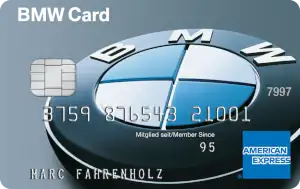

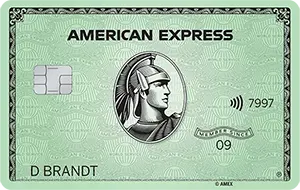


American Express offers a broad portfolio of charge cards in Germany — from no-fee entry cards, such as the Amex Blue and Amex Payback Card, to premium options like the Amex Gold and Amex Platinum Card. The entry-level cards are well-suited for newcomers, casual shoppers, or those building their credit profile. Higher-tier American Express credit cards offer travel insurance, purchase protection, and access to airport lounges, among other extras.
Amex users can also benefit from the Amex Offers program (merchant-specific deals) and earn points through the outstanding Membership Rewards system, which can be redeemed for travel, shopping, or statement credits. The 2 premium cards, American Express Gold and Platinum, offer additional VIP benefits that are useful in everyday life and when traveling.
While the services are extensive, users should be aware that cash withdrawals and foreign currency payments come with comparatively high fees.
German Credit Cards — Best Charge Card Alternatives 2025
Not every expat in Germany qualifies for a charge credit card — and not everyone wishes for this type of card. Fortunately, many credit card providers in Germany offer alternatives that combine flexibility, international usability, and even premium benefits. The 2 best options are revolving credit cards and modern debit cards, both of which can serve as effective substitutes for charge cards.
Revolving Credit Cards
Revolving cards allow partial repayments over time and charge interest on outstanding balances. However, many expats don’t realize that you can also use them like a charge card.
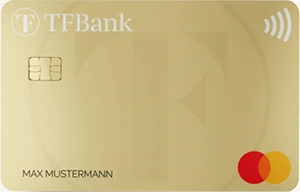
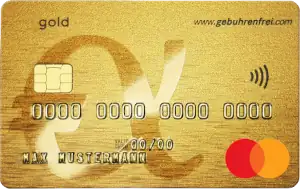
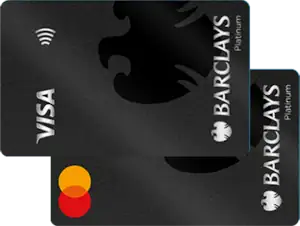
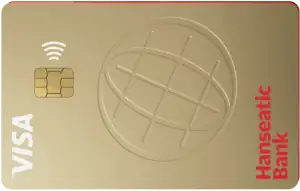
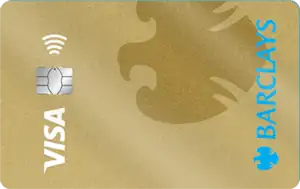
With revolving cards, you can usually set the minimum payment to 100% in your banking app — effectively turning them into charge cards and avoiding interest. This avoids interest altogether while providing you with access to all the benefits of the card.
Germany offers both premium revolving cards with annual fees and free credit cards with revolving function and solid features — for example, the TF Bank Mastercard Gold or the Advanzia No-Fee Mastercard Gold, which are 2 of the best free credit cards in Germany. These cards often include travel insurance, cash back, free cash withdrawal, and no foreign transaction fees, making them a practical option for expats who want real credit functionality without high upfront costs.
Debit Cards
Debit cards deduct funds directly from your linked bank account and don’t provide credit. However, they’re widely accepted, easily accessible, and often come with strong digital features. Debit Cards in Germany are either Visa or Mastercard credit cards. Some of them do not require a Schufa credit check.
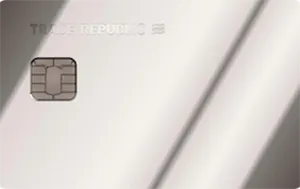
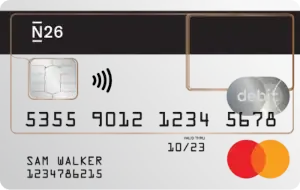
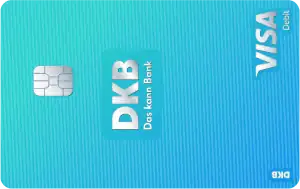
While some debit cards charge annual or monthly fees, many are issued for free — especially by mobile banks like N26 or Revolut. However, please note that these cards are typically not completely free, as they are often tied to checking accounts, and account maintenance fees may be applicable.
Modern debit cards from providers like N26 and Revolut go beyond the basics: premium plans include travel insurance, purchase protection, lounge access, and metal cards — perks usually associated with premium credit cards. For many expats, this combination of flexibility and benefits makes them a smart, accessible alternative to traditional charge cards.
Conclusion — Are Charge Credit Cards the Right Choice for Expats?
Charge credit cards are a strong and secure option for expats in Germany who receive a regular income and want the convenience of monthly billing without falling into debt. They combine flexibility with financial discipline, making them ideal for those who prefer to pay in full while enjoying travel perks, global acceptance, and bonus programs.
Although true charge cards are rare — with only DKB and American Express offering them in Germany — they remain a valuable product for long-term residents. For newcomers without a Schufa history or stable income, alternatives such as debit or prepaid credit cards may be a better starting point.
As your financial situation stabilizes, upgrading to a charge card can provide significant advantages, including enhanced consumer protection, improved acceptance for bookings, and the opportunity to establish a strong financial profile in Germany.
In short, charge cards are not for everyone, but for the right users, they are among the best German credit cards for responsible, benefit-rich spending.
Frequently Asked Questions — FAQ
A completely free credit card — one with no annual fee and no hidden charges for everyday use — can be a great option, especially for cost-conscious expats or those just settling in Germany. In addition, most free credit cards still incur transaction fees.
However, “free” doesn’t always mean the card offers the best value. Free credit cards may lack premium features such as insurance, reward programs, or concierge services. Some also charge extra for cash withdrawals or international payments.
To find the right free credit card, look beyond the headline “€0 annual fee.” Compare the full range of features and fees — including interest rates, international usability, and any requirements like a minimum income or Schufa check. For many users, a well-balanced card with modest fees and strong benefits may be a better long-term choice.
Yes, charge cards are widely accepted by rental car companies and hotels in Germany and around the world. Many rental agencies and hotel chains prefer real credit cards — including charge cards — over debit or prepaid cards, as they often place a security deposit or pre-authorization hold during booking.
Since charge cards provide a true credit line and are backed by major networks like Visa, Mastercard, or American Express, they typically meet the requirements for such transactions. Please ensure your card has a sufficient credit limit available when making a booking or checking in.
It’s difficult, but not impossible. Most German credit card providers require a positive Schufa score as proof of creditworthiness. However, some issuers — especially American Express — may accept applications from expats without a long Schufa history if they can prove stable income and residency. If you don’t yet have a Schufa record, it may be easier to start with a debit card or revolving credit card with flexible criteria, and apply for a charge card later.
If you miss the monthly payment on your charge card, the full balance will remain unpaid. Since charge cards don’t allow minimum payments or partial repayment, this could result in late fees, blocked card usage, or even contract termination. Some providers may offer a short grace period, but it’s essential to have sufficient funds in your linked bank account when the payment is due. Always check your credit card statement and set up reminders to avoid accidental delays.
